- Home
- Jr. Horatio Alger
Joe's Luck; Or, Always Wide Awake Page 5
Joe's Luck; Or, Always Wide Awake Read online
Page 5
He would have been confirmed in his opinion had he observed theglance of hatred with which the detected thief followed his youngward.
CHAPTER XI
JOE ARRIVES IN SAN FRANCISCO
At the isthmus they exchanged steamers, crossing the narrow neck ofland on the backs of mules. To-day the journey is more rapidly andcomfortably made in a railroad-car. Of the voyage on the Pacificnothing need be said. The weather was fair, and it was uneventful.
It was a beautiful morning in early September when they came in sightof the Golden Gate, and, entering the more placid waters of SanFrancisco Bay, moored at a short distance from the town.
"What do you think of it, Joe?" asked Charles Folsom.
"I don't know," said Joe slowly. "Is this really San Francisco?"
"It is really San Francisco."
"It doesn't seem to be much built up yet," said Joe.
In fact, the appearance of the town would hardly suggest the statelycapital of to-day, which looks out like a queen on the bay and theocean, and on either side opens her arms to the Eastern and Westerncontinents. It was a town of tents and one-story cabins, irregularlyand picturesquely scattered over the hillside, with here and there asawmill, where now stand some of the most prominent buildings of themodern city. For years later there was a large mound of sand wherenow the stately Palace Hotel covers two and a half acres. Where nowstand substantial business blocks, a quarter of a century since thereappeared only sandy beaches or mud-flats, with here and there awooden pier reaching out into the bay. Only five years before thetown contained but seventy-nine buildings--thirty-one frame,twenty-six adobe, and the rest shanties. It had grown largely sincethen, but even now was only a straggling village, with the air ofrecent settlement.
"You expected something more, Joe, didn't you?"
"Yes," admitted Joe.
"You must remember how new it is. Ten years, nay, five, will work agreat change in this straggling village. We shall probably live tosee it a city of a hundred thousand inhabitants."
The passengers were eager to land. They were tired of the longvoyage and anxious to get on shore. They wanted to begin makingtheir fortunes.
"What are your plans, Joe?" asked Charles Folsom.
"I shall accept the first job that offers," said Joe. "I can'tafford to remain idle long with my small capital."
"Joe," said the young man seriously, "let me increase your capitalfor you. You can pay me back, you know, when it is convenient.Here, take this gold piece."
Our young hero shook his head.
"Thank you, Mr. Folsom," he said, "you are very kind, but I think itwill be better for me to shift on what I have. Then I shall have togo to work at once, and shall get started in my new career."
"Suppose you can't find work?" suggested Folsom.
"I will find it," said Joe resolutely.
"Perhaps we might take lodgings together, Joe."
"I can't afford it," said Joe. "You're a gentleman of property, andI'm a poor boy who has his fortune to make. For the present I mustexpect to rough it."
"Well, Joe, perhaps you are right. At any rate, I admire your pluckand independent spirit."
There was a motley crowd collected on the pier and on the beach whenJoe and his friend landed. Rough, bearded men, in Mexican sombrerosand coarse attire--many in shirt-sleeves and with their pantaloonstucked in their boots--watched the new arrivals with interest.
"You needn't feel ashamed of your clothes, Joe," said Folsom, with asmile. "You are better dressed than the majority of those we see."
Joe looked puzzled.
"They don't look as if they had made their fortunes," he said.
"Don't judge by appearances. In a new country people are careless ofappearances. Some of these rough fellows, no doubt, have theirpockets full of gold."
At this moment a rough-looking fellow stepped forward and saidheartily:
"Isn't this Charles Folsom?"
"Yes," answered Folsom, puzzled.
"You don't remember me?" said the other, laughing.
"Not I."
"Not remember Harry Carter, your old chum?"
"Good Heaven!" exclaimed Folsom, surveying anew the rough figurebefore him. "You don't mean to say you are Harry Carter?"
"The same, at your service."
"What a transformation! Why, you used to be rather a swell andnow----"
"Now I look like a barbarian."
"Well, rather," said Folsom, laughing.
"You want me to explain? Such toggery as I used to wear would be theheight of folly at the mines."
"I hope you have had good luck," said Folsom.
"Pretty fair," said Carter, in a tone of satisfaction. "My pile hasreached five thousand dollars."
"And how long have you been at work?"
"A year. I was a bookkeeper in New York on a salary of fifteenhundred dollars a year. I used to spend all my income--the more foolI--till the last six months, when I laid by enough to bring me outhere."
"Then you have really bettered yourself?"
"I should say so. I could only save up five hundred dollars a yearat the best in New York. Here I have crowded ten years into one."
"In spite of your large outlay for clothes?"
"I see you will have your joke. Now, what brings you out here? Areyou going to the mines?"
"Presently, but not to dig. I came to survey the country."
"Let me do what I can for you."
"I will. First, what hotel shall I go to?"
"There is the Leidesdorff House, on California Street. I'll lead youthere."
"Thank you. Will you come, Joe?"
"Yes, I will go to find out where it is."
The three bent their steps to the hotel referred to. It was a shantycompared with the magnificent hotels which now open their portals tostrangers, but the charge was ten dollars a day and the fare was ofthe plainest.
"I guess I won't stop here," said Joe, "My money wouldn't keep mehere more than an hour or two."
"At any rate, Joe, you must dine with me," said Folsom. "Then youmay start out for yourself."
"You must dine with me, both of you," said Carter.
Folsom saw that he was in earnest, and accepted.
The dinner was plain but abundant, and all three did justice to it.Joe did not know till afterward that the dinner cost five dollarsapiece.
After dinner the two friends sat down to talk over old times andmutual friends, but Joe felt that there was no time for him to lose.He had his fortune to make. Still more important, he had his livingto make, and in a place where dollars were held as cheap as dimes inNew York or Boston.
So, emerging into the street, with his small bundle under his arm, hebent his steps as chance directed.
CHAPTER XII
JOE FINDS A JOB
Joe knew nothing about the streets or their names. Chance broughthim to Clay Street, between what is now Montgomery and KearnyStreets. Outside of a low wooden building, which appeared to be arestaurant, was a load of wood.
"I wonder if I couldn't get the chance to saw and split that wood?"thought Joe.
It would not do to be bashful. So he went in.
A stout man in an apron was waiting on the guests. Joe concludedthat this must be the proprietor.
"Sit down, boy," said he, "if you want some dinner."
"I've had my dinner," said Joe. "Don't you want that wood outsidesawed and split?"
"Yes."
"Let me do it."
"Go ahead."
There was a saw and saw-horse outside. The work was not new to Joe,and he went at it vigorously. No bargain had been made, but Joe knewso little of what would be considered a fair price that in this firstinstance he chose to leave it to his employer.
As he was at work Folsom and his friend passed by.
"Have you found a job already?" said Folsom.
"Yes, sir."
"You have kept your promise, Joe. You said you would take the fi
rstjob that offered."
"Yes, Mr. Folsom; I meant what I said."
"Come round to the Leidesdorff House this evening and tell me how youmade out."
"Thank you, sir, I will."
"That seems a smart boy," said Carter.
"Yes, he is. Help him along if you have a chance."
"I will. I like his pluck."
"He has no false pride. He is ready to do anything."
"Everybody is here. You know Jim Graves, who used to have hisshingle up as a lawyer on Nassau Street?"
"Yes. Is he here?"
"He has been here three months. What do you think he is doing?"
"I couldn't guess."
"I don't think you could. He has turned drayman." Charles Folsomgazed at his friend in wonder.
"Turned drayman!" he exclaimed. "Is he reduced to that?"
"Reduced to that! My dear fellow, you don't understand the use oflanguage. Graves is earning fifteen dollars a day at his business,and I don't believe he made that in New York in a month."
"Well, it is a strange state of society. Does he mean to be adrayman all his life?"
"Of course not. A year hence he may be a capitalist, or a lawyeragain. Meanwhile he is saving money."
"He is a sensible man, after all; but, you see, Carter, it takes timeto adjust my ideas to things here. The first surprise was your roughappearance."
"There is one advantage my rough life has brought me," said Carter."It has improved my health. I was given to dyspepsia when I lived inNew York. Now I really believe I could digest a tenpenny nail,or--an eating-house mince pie, which is more difficult."
"You have steep hills in San Francisco."
"Yes, it is something of a climb to the top of Clay Street Hill.When you get to the top you get a fine view, though."
Now the hill may be ascended in cars drawn up the steeply gradedsides by an endless rope running just below the surface. No sucharrangement had been thought of then. Folsom gave out when he hadcompleted half the ascent.
"I'll be satisfied with the prospect from here," he said.
Meanwhile Joe kept steadily at his task.
"It will take me three hours and a half, possibly four," he said tohimself, after a survey of the pile. "I wonder what pay I shallreceive."
While thus employed many persons passed him.
One among them paused and accosted him.
"So you have found work already?" he said.
Looking up, Joe recognized Harry Hogan, the man who had swindled him.He didn't feel inclined to be very social with this man.
"Yes," said he coldly.
"Rather strange work for a first-class passenger."
He envied Joe because he had traveled first-class, while he hadthought himself fortunate, with the help his dishonesty gave him, inbeing able to come by steerage.
"It is very suitable employment for a boy who has no money," said Joe.
"How much are you going to be paid for the job?" asked Hogan, withsudden interest, for ten dollars constituted his only remaining funds.
If his theft on shipboard had not been detected he would have beenbetter provided.
"I don't know," said Joe shortly.
"You didn't make any bargain, then?"
"No."
"What are you going to do next?" inquired Hogan.
"I don't know," said Joe.
Hogan finally moved off.
"I hate that boy," he soliloquized. "He puts on airs for a countryboy. So he's getting too proud to talk to me, is he? We'll see, Mr.Joseph Mason."
Joe kept on till his task was completed, put on his coat and wentinto the restaurant.
It was the supper-hour.
"I've finished the job," said Joe, in a businesslike tone.
The German took a look at Joe's work.
"You did it up good," he said. "How much you want?"
"I don't know. What would be a fair price?"
"I will give you some supper and five dollars."
Joe could hardly believe his ears. Five dollars and a supper forfour hours' work! Surely he had come to the Land of Gold in verytruth.
"Will dat do?"
"Oh, yes," said Joe. "I didn't expect so much."
"You shouldn't tell me dat. It isn't business."
Joe pocketed the gold piece which he received with a thrill ofexultation. He had never received so much in value for a week's workbefore. Just then a man paid two dollars for a very plain supper.
"That makes my pay seven dollars," said Joe to himself. "If I canget steady work, I can get rich very quick," he thought.
There was one thing, however, that Joe did not take into account. Ifhis earnings were likely to be large, his expenses would be large,too. So he might receive a good deal of money and not lay up a cent.
"Shall you have any more work to do?" asked Joe.
"Not shoost now," answered the German. "You can look round in aweek. Maybe I have some then."
CHAPTER XIII
JOE'S HOTEL
Before going to the Leidesdorff House to call upon his friend Folsom,Joe thought he would try to make arrangements for the night.
He came to the St. Francis Hotel, on the corner of Dupont and ClayStreets. There was an outside stair that led to the balcony that ranall round the second story. The doors of the rooms opened upon thisbalcony.
A man came out from the office.
"Can I get lodging here?" asked Joe.
"Yes."
"How much do you charge?"
"Three dollars."
"He must take me for a millionaire," thought Joe.
"I can't afford it," he said.
As Joe descended the stairs he did not feel quite so rich. Sixdollars won't go far when lodging costs three dollars and supper two.
Continuing his wanderings, Joe came to a tent, which seemed to be ahotel in its way, for it had "Lodgings" inscribed on the canvas infront.
"What do you charge for lodgings?" Joe inquired.
"A dollar," was the reply.
Looking in, Joe saw that the accommodations were of the plainest.Thin pallets were spread about without pillows. Joe was not used toluxury but to sleep here would be roughing it even for him. But hewas prepared to rough it, and concluded that he might as well passthe night here.
"All right!" said he. "I'll be round by and by."
"Do you want to pay in advance to secure your bed?"
"I guess not; I'll take the risk."
Joe went on to the Leidesdorff Hotel and was cordially received byMr. Folsom.
"How much have you earned to-day, Joe?"
"Five dollars and my supper."
"That's good. Is the job finished?"
"Yes, sir."
"And you have nothing in view for to-morrow?"
"No, sir; but I guess I shall run across a job."
"Where are you going to spend the night?"
"In a tent a little way down the street."
"How much will they charge you?"
"One dollar."
"I wish my bed was large enough to hold two; you should be welcome toa share of it. But they don't provide very wide bedsteads in thiscountry."
Mr. Folsom's bed was about eighteen inches wide.
"Thank you, sir," said Joe; "I shall do very well in the tent, I amsure."
"I am thinking of making a trip to the mines with my friend Carter,"continued Folsom. "Very likely we shall start to-morrow. Do youwant to go with us?"
"I expect to go to the mines," said Joe, "but I think I had betterremain awhile in San Francisco, and lay by a little money. You knowI am in debt."
"In debt?"
"Yes, for my passage. I should like to pay that off."
"There is no hurry about it, Joe."
"I'd like to get it off my mind, Mr. Folsom."
About nine o'clock Joe left the hotel and sought the tent where heproposed to pass the night. He was required to pay in advance, andwillingly did so.
CHAPTER XIV
/>
JOE'S SECOND DAY
Joe woke up at seven o'clock the next morning. Though his bed washard, he slept well, for he was fatigued. He stretched himself andsat up on his pallet. It is needless to say that he had notundressed. Three or four men were lying near him, all fast asleepexcept one, and that one he recognized as Henry Hogan.
"Halloo!" said Hogan. "You here?"
"Yes," said Joe, not overpleased at the meeting.
"We seem to keep together," said Hogan, with a grin.
"So it seems," said Joe coldly.
Hogan, however, seemed disposed to be friendly.
"Pretty rough accommodations for the money."
"It doesn't make so much difference where money is earned easily."
"How much money did you make yesterday?"
Joe's first thought was to tell him it was none of his business, buthe thought better of it.
"I made seven dollars," said he, rather proudly.
"Pretty good, but I beat you," said Hogan.
"How much did you make?"
"I'll show you."
Hogan showed five half-eagles.
"I made it in ten minutes," he said.
Joe was decidedly mystified.
"You are fooling me," he said.
"No, I am not. I made it at the gaming-table."

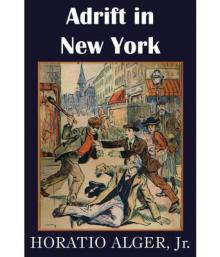 Adrift in New York: Tom and Florence Braving the World
Adrift in New York: Tom and Florence Braving the World Do and Dare — a Brave Boy's Fight for Fortune
Do and Dare — a Brave Boy's Fight for Fortune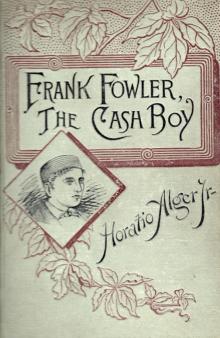 The Cash Boy
The Cash Boy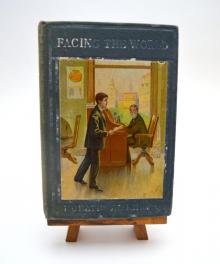 Facing the World
Facing the World The Young Explorer; Or, Claiming His Fortune
The Young Explorer; Or, Claiming His Fortune The Store Boy
The Store Boy Frank's Campaign; Or, The Farm and the Camp
Frank's Campaign; Or, The Farm and the Camp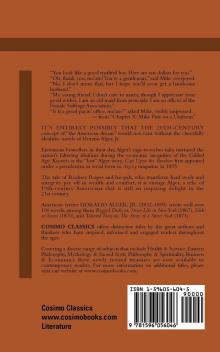 Cast Upon the Breakers
Cast Upon the Breakers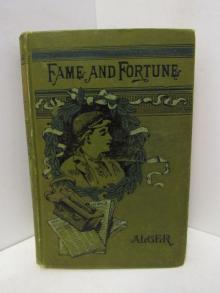 Fame and Fortune; or, The Progress of Richard Hunter
Fame and Fortune; or, The Progress of Richard Hunter The Errand Boy; Or, How Phil Brent Won Success
The Errand Boy; Or, How Phil Brent Won Success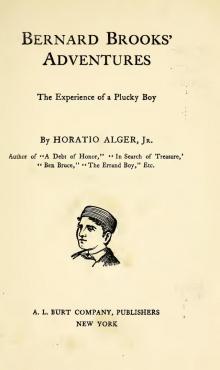 Bernard Brooks' Adventures: The Experience of a Plucky Boy
Bernard Brooks' Adventures: The Experience of a Plucky Boy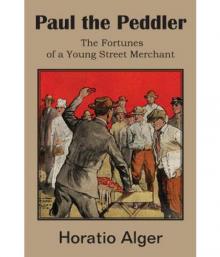 Paul the Peddler; Or, The Fortunes of a Young Street Merchant
Paul the Peddler; Or, The Fortunes of a Young Street Merchant Brave and Bold; Or, The Fortunes of Robert Rushton
Brave and Bold; Or, The Fortunes of Robert Rushton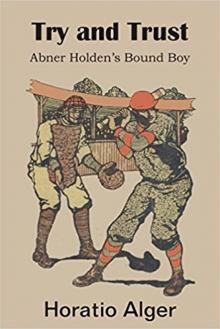 Try and Trust; Or, Abner Holden's Bound Boy
Try and Trust; Or, Abner Holden's Bound Boy Phil, the Fiddler
Phil, the Fiddler In A New World; or, Among The Gold Fields Of Australia
In A New World; or, Among The Gold Fields Of Australia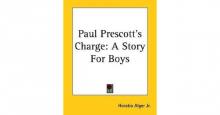 Paul Prescott's Charge
Paul Prescott's Charge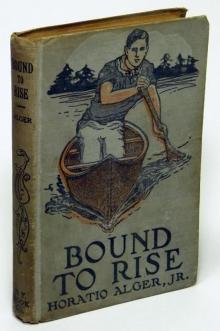 Joe's Luck; Or, Always Wide Awake
Joe's Luck; Or, Always Wide Awake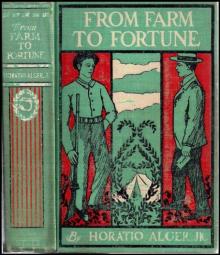 From Farm to Fortune; or, Nat Nason's Strange Experience
From Farm to Fortune; or, Nat Nason's Strange Experience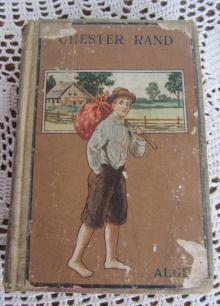 Chester Rand; or, The New Path to Fortune
Chester Rand; or, The New Path to Fortune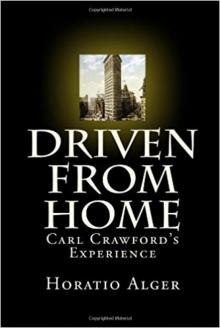 Driven from Home; Or, Carl Crawford's Experience
Driven from Home; Or, Carl Crawford's Experience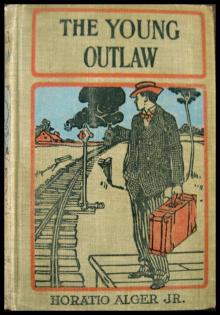 The Young Outlaw; or, Adrift in the Streets
The Young Outlaw; or, Adrift in the Streets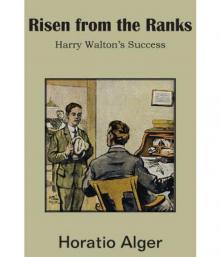 Risen from the Ranks; Or, Harry Walton's Success
Risen from the Ranks; Or, Harry Walton's Success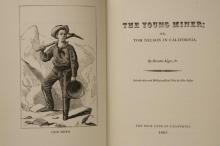 The Young Miner; Or, Tom Nelson in California
The Young Miner; Or, Tom Nelson in California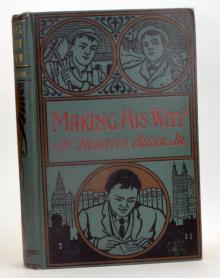 Making His Way; Or, Frank Courtney's Struggle Upward
Making His Way; Or, Frank Courtney's Struggle Upward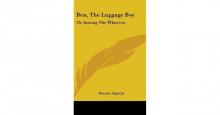 Ben, the Luggage Boy; Or, Among the Wharves
Ben, the Luggage Boy; Or, Among the Wharves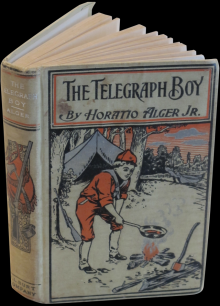 The Telegraph Boy
The Telegraph Boy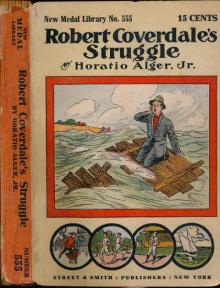 Robert Coverdale's Struggle; Or, on the Wave of Success
Robert Coverdale's Struggle; Or, on the Wave of Success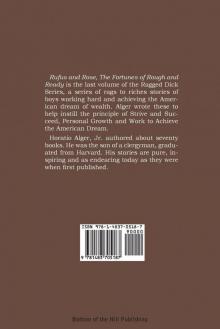 Rufus and Rose; Or, The Fortunes of Rough and Ready
Rufus and Rose; Or, The Fortunes of Rough and Ready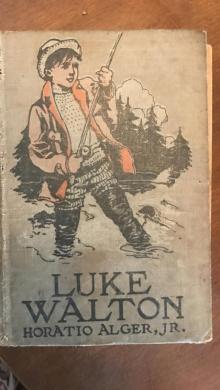 Luke Walton
Luke Walton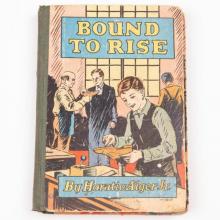 Mark Mason's Victory: The Trials and Triumphs of a Telegraph Boy
Mark Mason's Victory: The Trials and Triumphs of a Telegraph Boy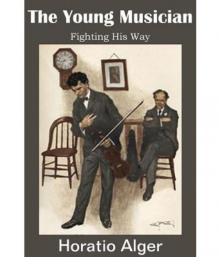 The Young Musician; Or, Fighting His Way
The Young Musician; Or, Fighting His Way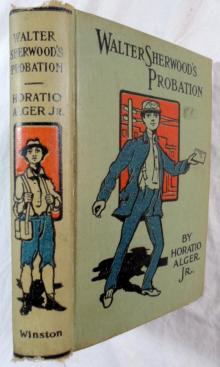 Walter Sherwood's Probation
Walter Sherwood's Probation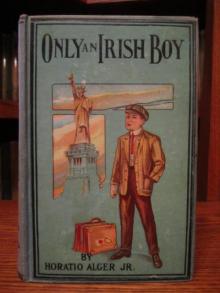 Only an Irish Boy; Or, Andy Burke's Fortunes
Only an Irish Boy; Or, Andy Burke's Fortunes Slow and Sure: The Story of Paul Hoffman the Young Street-Merchant
Slow and Sure: The Story of Paul Hoffman the Young Street-Merchant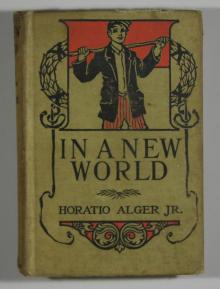 Herbert Carter's Legacy; Or, the Inventor's Son
Herbert Carter's Legacy; Or, the Inventor's Son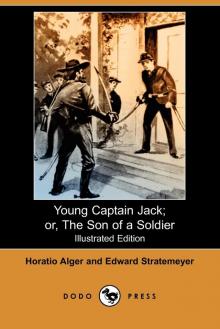 Young Captain Jack; Or, The Son of a Soldier
Young Captain Jack; Or, The Son of a Soldier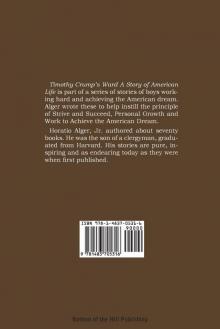 Timothy Crump's Ward: A Story of American Life
Timothy Crump's Ward: A Story of American Life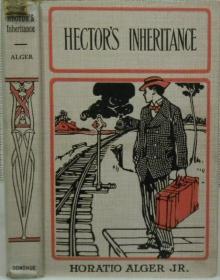 Hector's Inheritance, Or, the Boys of Smith Institute
Hector's Inheritance, Or, the Boys of Smith Institute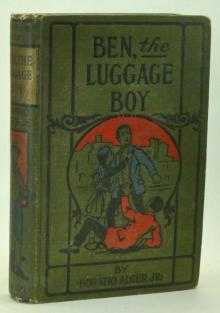 Ben's Nugget; Or, A Boy's Search For Fortune
Ben's Nugget; Or, A Boy's Search For Fortune